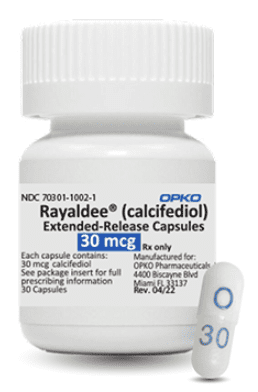Rayaldee
Generic name: calcifediol [ KAL-sif-e-DYE-ol ]
Drug class: Vitamins
What is Rayaldee?
Rayaldee is a vitamin D3. Vitamin D is important for the absorption of calcium from the stomach and for the functioning of calcium in the body.
Rayaldee is used to treat secondary hyperparathyroidism (overactive parathyroid glands) in adults who have stage 3 or 4 chronic kidney failure and low vitamin D levels. This medicine is not for people who are receiving dialysis.
Rayaldee may also be used for purposes not listed in this medication guide.
Rayaldee side effects
Get emergency medical help if you have signs of an allergic reaction: hives; difficult breathing; swelling of your face, lips, tongue, or throat.
Rayaldee may cause serious side effects. Call your doctor at once if you have:
-
shortness of breath (even with mild exertion), swelling, rapid weight gain;
-
high calcium levels--confusion, tiredness, nausea, vomiting, loss of appetite, constipation, increased thirst or urination, weight loss; or
-
low red blood cells (anemia)--pale skin, unusual tiredness, feeling light-headed or short of breath, cold hands and feet.
Common side effects of Rayaldee may include:
-
constipation; or
-
runny or stuffy nose, sneezing, sore throat.
This is not a complete list of side effects and others may occur. Call your doctor for medical advice about side effects. You may report side effects to FDA at 1-800-FDA-1088.
Related/similar drugs
Warnings
Follow all directions on your medicine label and package. Tell each of your healthcare providers about all your medical conditions, allergies, and all medicines you use.
Before taking this medicine
Tell your doctor if you have ever had:
-
heart problems; or
-
high levels of calcium in your blood (hypercalcemia).
Tell your doctor if you are pregnant or plan to become pregnant. It is not known whether Rayaldee will harm an unborn baby. However, having chronic kidney disease during pregnancy may cause complications such as miscarriage, premature birth, low birth weight, stillbirth, or eclampsia (dangerously high blood pressure that can lead to medical problems in both mother and baby). The benefit of treating kidney disease may outweigh any risks to the baby.
If you are breastfeeding, tell your doctor if you notice vomiting, constipation, weight loss, or seizures in the nursing baby.
How should I take Rayaldee?
Follow all directions on your prescription label and read all medication guides or instruction sheets. Your doctor may occasionally change your dose. Use the medicine exactly as directed.
Take Rayaldee at bedtime each day.
Swallow the extended-release capsule whole and do not crush, chew, break, or open it.
You will need frequent medical tests.
Store at room temperature away from moisture and heat.
What happens if I miss a dose?
Skip the missed dose and use your next dose at the regular time. Do not use two doses at one time.
What happens if I overdose?
Seek emergency medical attention or call the Poison Help line at 1-800-222-1222.
Overdose symptoms may include vomiting, constipation, loss of appetite, feeling tired or irritable, muscle weakness, feeling very thirsty or hot, or urinating less than usual.
What should I avoid while taking Rayaldee?
Ask a doctor or pharmacist before using any vitamins or mineral supplements. Many non-prescription dietary supplements contain calcium or vitamin D. Taking certain products together can cause you to get too much of these ingredients.
What other drugs will affect Rayaldee?
Sometimes it is not safe to use certain medicines at the same time. Some drugs can affect your blood levels of other drugs you use, which may increase side effects or make the medicines less effective.
Tell your doctor about all your other medicines, especially:
-
digoxin, digitalis;
-
phenobarbital or other seizure medications;
-
an antibiotic or antifungal medicine;
-
antiviral medicine to treat hepatitis C or HIV/AIDS;
-
a diuretic or "water pill";
-
heart medication; or
-
medications or mineral supplements that contain calcium or vitamin D.
This list is not complete and many other drugs may affect Rayaldee. This includes prescription and over-the-counter medicines, vitamins, and herbal products. Not all possible drug interactions are listed here.
Popular FAQ
What is Rayaldee used for?
Rayaldee (calcifediol) extended-release capsules are used to treat adults with overactive parathyroid glands (hyperparathyroidism) who have stage 3 or 4 chronic kidney disease and low levels of vitamin D (less than 30 ng/ml). Continue reading
More about Rayaldee (calcifediol)
- Check interactions
- Compare alternatives
- Pricing & coupons
- Reviews (7)
- Drug images
- Side effects
- Dosage information
- During pregnancy
- FDA approval history
- Drug class: vitamins
- En español
Patient resources
Professional resources
Related treatment guides
Further information
Remember, keep this and all other medicines out of the reach of children, never share your medicines with others, and use this medication only for the indication prescribed.
Always consult your healthcare provider to ensure the information displayed on this page applies to your personal circumstances.
Copyright 1996-2025 Cerner Multum, Inc. Version: 4.01.

